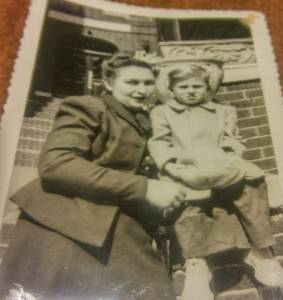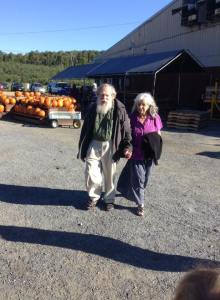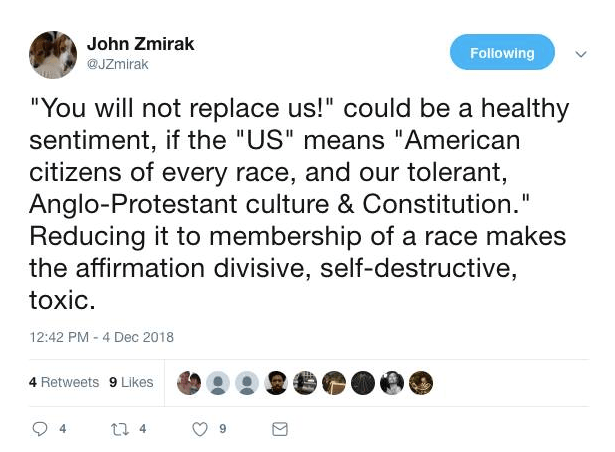Louis Villarubia says he’s not an anti-semite.
The self-styled religious brother, who calls himself Brother André Marie, is listed as prior of the St. Benedict Center in Richmond, NH, which was recently put under strict sanctions by the diocese of Manchester and can no longer call itself a Catholic organization.
Villarubia and the St. Benedict Center have been dogged by accusations of anti-semitism since its foundation; but Villarubia said in a recent statement on the Center’s website that the allegations are “a vicious and unfounded calumny.” He offered a “categorical rejection of the label, ‘anti-Semite'” and called the claim “purely manufactured.”
“Conversion to Jesus Christ and His true Church is our message to Jew and Gentile alike. Where is the hate there? It is purely manufactured,” Villarubia wrote.
But in a 1998 speech at the St. Benedict Center, Villarubia said that Jews are the “worst enemy of the Church;” that God has turned his back on the Jews; that the Catholic Church is at war with the Synagogue; that the Jewish people side with the “seed of the Devil;” He spoke of the Jews’ “avarice, treachery and usury” as symptoms of their “supernatural sickness” and said Jews are like Cain and desire to overtake and usurp the Church, and that they’re responsible for the “loss of countless souls.” He referred to the late Cardinal O’Connor as a “Jew lover” who “defended the gospel of the Holocaust wherever he goes;” and said “The Jew is not my brother.” He concluded his speech: “We of St. Benedict Center must also hold a strong position against the Jews, or we would not be true to our foundation.”
I asked Villarubia on Monday if he rejects the statements he made in that speech. He answered, “I definitely reject any suggestion that a majority of the Jewish people are hostile to the Faith, and regret the tone of speech and some of the unkind expressions I used in it. We want to evangelize people, after all, not drive them away.”
The speech, which is excerpted extensively at the end of this article, was removed from the organization’s website around 2009 at the request of then-bishop John McCormack. After members of the group signed a letter renouncing anti-semitism and signaling their intention to come into compliance, the diocese then allowed the Center to bring a priest in good standing in from another diocese onto the premises to offer the sacraments.
One of the priests they brought in was Fr. Rudolf Grega, a Canadian priest who, according to brotherandre.weebly.com was accused of having been dismissed from the FSSP for “failing to observe clerical celibacy.”
The St. Benedict Center has also been investigated by the FBI for allegedly holding a woman against her will, an accusation Villarubia has denied.
The Center, located in a remote, rural setting, houses a number of religious men and women who, according to the site, belong to the Slaves of the Immaculate Heart of Mary, an order which is not recognized by the Church. It also attracts lay people and includes a school, a summer camp, and a printing press. The Center promotes their interpretation of the teaching “extra ecclesiam nulla salus” (no salvation outside the Church) as a major feature of its mission, which it makes a point of calling a “Crusade.”
Even after the Slaves signed letters of obedience in 2009, the Center continued to teach and promote an erroneously harsh and narrow interpretation of the teaching that there is no salvation outside the Catholic Church, explicitly contradicting Church teaching; and to persist in presenting themselves as an independent Catholic organization, leading the diocese to impose new sanctions in 2019. According to the Diocese of Manchester:
“The Congregation for the Doctrine of the Faith in Rome, in April 2016 and again in October 2016, declared ‘unacceptable,’ therefore erroneous and contrary to Church teachings, the manner with which the Saint Benedict Center and the Slaves of the Immaculate Heart of Mary interpret the principle “extra ecclesiam nulla salus,” (outside the Church there is no salvation.) Rome pronounced the matter closed, thus no longer open to dialogue or debate.”
The diocese said the organization and its school can no longer call themselves “Catholic,” and Catholics may no longer receive the sacraments there.
As of April 28, 2019, the St. Benedict Center’s website (which is called catholicism.org) continues to claim:
“Our congregation is a de facto private association of the faithful (in accord with canon 299 §1). We have a priest in residence offering Holy Mass and hearing confessions with the requisite faculties from the Bishop of Manchester, New Hampshire.” [boldface is in orginal]
They claim on their site to be a congregation of religious brother and sisters as well as a third order lay organization; but the Diocese of Manchester said:
“The individuals who work and reside at Saint Benedict Center in Richmond, NH, are men and women who have chosen to live in community having adopted and following their own set of rules. Neither Saint Benedict Center, the Immaculate Heart of Mary School, nor the self-referenced “Slaves of the Immaculate Heart of Mary,” enjoy any recognition, canonical or otherwise, in the Universal Roman Catholic Church or in the Diocese of Manchester.”
The diocese has given the Center until the end of June to come into compliance with Church teaching. I asked Villarubia if the Center intends to comply. He responded,
“As canonical litigation against the precept is currently pending before the Holy See, I cannot answer your question at this time. We pray for the Bishop of Manchester, that he may come to see just how this community of truly Catholic daughters and sons of the Church have been and continue to be wronged by the precept’s false assertions of fact presupposing its issuance.”
According to the diocese, Bishop Libasci “[i]n his pastoral care for the souls of those who work, live at, or reside near the Saint Benedict Center” has arranged for a weekly celebration of the Extraordinary Form of the Mass in nearby Winchester, NH.
The Catholic Herald UK recently noted:
Certain Catholics will write off the CDF’s sanctions as mere anti-traditionalist animus . . .[but] The CDF (or at least Manchester) is taking great pains to make clear that this dispute is about the dogma of extra Ecclesiam nulla salus and not about the status of traditionalists in the Church more broadly. Bishop Libasci himself is considered broadly conservative and has made generous provisions for the traditionalist Priestly Fraternity of St Peter (FSSP) to operate within the diocese.
The group has been in Richmond since the mid 80’s, and they operate the St. Benedict Center, a school, and a summer camp, a priory and convent, as well as publications, a radio show, and websites. They are an offshoot of the Slaves of the Immaculate Heart and St. Benedict Center in Still River, MA, which was founded in 1940; but they are no longer affiliated with each other.
Following a series of lawsuits which were decided against Br. Francis Maluf, co-founder of the Slaves, the Still River group cut ties with the Richmond group, and the Still River group has since been recognized by the Church as being obedient to their bishop. The Still River group is the topic of a new memoir, Little Sister, by Patricia Walsh Chadwick, who was raised by the group’s leaders and alleges that the insular religious community was abusive and violent, separating parents from children and splitting up marriages in the name of sanctification.
Fr. Leonard Feeney, who founded the original St. Benedict Center, was excommunicated in 1953 after he persisted in teaching that no one can be saved if they are not baptized Catholic; but he reportedly recited the Athanasian Creed on his deathbed and so is widely acknowledged to have died within the mercy of the Church. Even the ultra-traditionalist SSPX (Society of St. Pius X) acknowledges Feeney to have been in error on the matter of “extra ecclesiam nulla salus.“ Feeney is lauded on the Richmond St. Benedict site, and they are among his followers who deny that he repented of his heretical beliefs. The Richmond group is one of the most radical splinter groups to form from the original Fenneyites.
When I asked Villarubia how he came to regret the “tone of speech” and “unkind expressions” in his 1998 speech, he responded,
“Prayer and experience. In the time since I gave that speech, I have learned that a charitable approach toward those who do not accept our Faith is the best witness; it is the witness of the saints. If we are going to work for the evangelization of America, we must act out of love of God and love of neighbor. Our neighbor must see the Charity of Jesus Christ in us or we fail in our apostolate.”
In 1958, Feeney wrote that “the Jewish race constitutes a united anti-Christian bloc within Christian society, and is working for the overthrow of that society by every means at its disposal.”
I asked Villarubia if he rejects this statement by Fr. Feeney. He did not respond.
Villarubia will be a featured speaker at the upcoming first annual Chivalry Conference along with three prominent Catholics, including the scholar and author Joseph Pearce, radio personality Mike Church, and author C.G. Dilsaver. The conference, which is sponsored by Church’s Crusade Channel and The Latin Mass Society of Central New Jersey, will address the matter of “Raising Chivalrous Young Men In An Increasingly Decadent Society.”
Joseph Pearce, one of the other speakers at the upcoming Chivalry Conference that will host Villarubia, said, “I hate and despise antisemitism and Neo-naziism; but I do have sympathy with the views of Voltaire: I may despise what you say, but I’ll fight to the death for your right to say it.”
Pearce said that he was not familiar with Villarubia, but that as a former neo-Nazi himself who has publicly repented, he doesn’t believe in isolating extremists.
“One reason I’m happy to speak anywhere is in order to have what I hope is a positive impact, to draw people toward authentic Catholicism, whether they’re a ‘mad, bad trad’ or a liberal extremist. I’m hoping being out there, speaking and writing, will have a positive impact to bring them closer to reconciliation,” he said.
The other two speakers are C. J. Dilsaver, developer of psychomoralitics and author of The Three Marks of Manhood: How to be Priest, Prophet and King of Your Family and Celebrating God-Given Gender; and Mike Church, an independent radio host whose Sirius XM show was cancelled in 2015, allegedly for being too Catholic. Church then launched the Crusade Channel, which is sponsoring the conference with the Latin Mass Society of Central New Jersey. Church did not respond to requests for comment.
Here are excerpts from the speech delivered by Louis Villarubia, a.k.a. Brother André Marie, in 1998.
***
What are we to say of the Jews? It is horrible to say, but true: Both physically and spiritually the Son of God turned his back to proud Jerusalem and to its stiff-necked inhabitants.
…
[T]he Synagogue — the Church of the Old Testament — was replaced by the Catholic Church and the mystical war between the two — a war which will not end until the consummation of the world — was begun.
… history is the story of the war between the seed of Mary and the seed of the devil. Upon their rejection of Christ, the Jews took sides in this war, and became the chief society of men forming the “children and slaves of the devil” . . . From the crucifixion on, the once chosen nation became the worst enemy of the Church — and will be until its prophesied conversion.
…
“This, in essence, is the ‘Jewish Problem'”: They are the anti-Christ people whose damnable nationalism and anti-messianic naturalism oppose the supernatural supranational aims of Christ and His Church. The avarice of the Jews, their refusal to assimilate into nations they inhabit, their usury and treachery are only symptoms of their greatest sickness; and although these traits are obvious to observers throughout all history, they are only naturally observable results of a problem properly viewed from a supernatural, that is, a Catholic, perspective.
…
By way of Jewish takeovers, there is only one thing that could be worse than the usurpation of the Holy Land, the earthly Jerusalem and that is a Jewish takeover of the New Jerusalem, the new Zion: the Catholic Church . . .and like Cain before him, the old Jerusalem seeks to kill the one whose sacrifice was accepted, while his own was rejected. While a Jewish defeat of the Church is impossible, the corroding effect they have on the Mystical Body will be measured in the loss of countless souls.
…
Richard Cardinal Cushing … insisted the Jews be absolved of the crime of deicide. Cushing had earned his reputation as a Jew lover years before, when he persecuted Father Feeney and accused him of anti-Semitism. “If i don’t see you in heaven when I get there, ” said the Cardinal to a group of Jews, “I’ll know that you haven’t died yet.” … [a]t the time of the Council, Bishops who were considered conservative had a hard time with an ecumenical Council’s promotion of the Jewish cause. Today, however, even supposed conservatives are Jew lovers.
…
Lately, his Eminence [Cardinal O’Connor] has been defending the gospel of the holocaust wherever he goes.
…
When Cardinal O’Connor recently stated that the Catholic Church was not meant to replace Judaism, he justified his heresy by saying, “That’s what the Pope says and I work for the Pope.” Would that this were not true. On April 13, 1986, the Holy Father entered into the Synagogue of Rome where he and Chief Rabbi, Elio Toaff, addressed the assembled congregation. Part of the Pope’s message was this: “[T]he Church of Christ, in examining its own mystery, discovered its bond with Judaism. The Jewish religion is not extrinsic to us, but in a certain way is intrinsic to our religion… You are our favorite brothers and in some ways, one could say, our elder brothers.” This scandalous speech has been the source of all this talk of the Jews being our “elder brothers in the Faith.”
…
To talk of the Jews as our brothers is to deny the supernatural order established by God. … The Jew is not my brother. I have God as my Father and Mary Immaculate as my Mother. This is true, because by faith and Baptism I am a member of the Mystical Body of Christ, and He is the only Begotten. He is the seed of Abraham to whom the promise was made, and we Catholics are the heirs of that promise because of our union with jesus. As for the Jews, our Lord Himself told them that they did NOT have Abraham for their Father, but the devil. Abraham is my father, not the father of any Talmudic Jew.
…
Which is why the problem of the Jews is a serious problem . . . The Catholic Church has always had a strong position on the Jewish question and will again when she regains her vigor. As adherents of tradition, we of St. Benedict Center must also hold a strong position against the Jews, or we would not be true to our foundation.
***
Photo of Louis Villarubia, aka Br. André Marie, at a recent town meeting in Richmond, NH; courtesy Damien Fisher




































